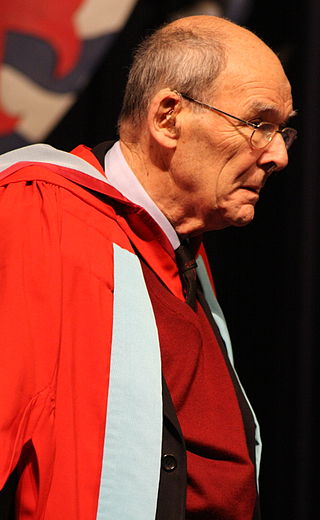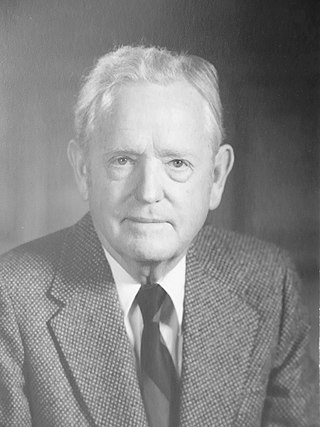Related Research Articles

Metaphysics is the branch of philosophy that studies the fundamental nature of reality, the first principles of being, identity and change, space and time, causality, necessity, and possibility. It includes questions about the nature of consciousness and the relationship between mind and matter, between substance and attribute, and between potentiality and actuality. The word "metaphysics" comes from two Greek words that, together, literally mean "after or behind or among [the study of] the natural". It has been suggested that the term might have been coined by a first century CE editor who assembled various small selections of Aristotle's works into the treatise we now know by the name Metaphysics.
Materialism is a form of philosophical monism which holds matter to be the fundamental substance in nature, and all things, including mental states and consciousness, are results of material interactions. According to philosophical materialism, mind and consciousness are by-products or epiphenomena of material processes, without which they cannot exist. This concept directly contrasts with idealism, where mind and consciousness are first-order realities to which matter is dependent while material interactions are secondary.

In metaphysics, nominalism is the view that universals and abstract objects do not actually exist other than being merely names or labels. There are at least two main versions of nominalism. One version denies the existence of universals – things that can be instantiated or exemplified by many particular things. The other version specifically denies the existence of abstract objects – objects that do not exist in space and time.

In metaphysics, ontology is the philosophical study of being, as well as related concepts such as existence, becoming, and reality.

The problem of universals is an ancient question from metaphysics that has inspired a range of philosophical topics and disputes: Should the properties an object has in common with other objects, such as color and shape, be considered to exist beyond those objects? And if a property exists separately from objects, what is the nature of that existence?
In metaphysics, a universal is what particular things have in common, namely characteristics or qualities. In other words, universals are repeatable or recurrent entities that can be instantiated or exemplified by many particular things. For example, suppose there are two chairs in a room, each of which is green. These two chairs both share the quality of "chairness", as well as greenness or the quality of being green; in other words, they share a "universal". There are three major kinds of qualities or characteristics: types or kinds, properties, and relations. These are all different types of universals.

Aristotelianism is a philosophical tradition inspired by the work of Aristotle, usually characterized by deductive logic and an analytic inductive method in the study of natural philosophy and metaphysics. It covers the treatment of the social sciences under a system of natural law. It answers why-questions by a scheme of four causes, including purpose or teleology, and emphasizes virtue ethics. Aristotle and his school wrote tractates on physics, biology, metaphysics, logic, ethics, aesthetics, poetry, theatre, music, rhetoric, psychology, linguistics, economics, politics, and government. Any school of thought that takes one of Aristotle's distinctive positions as its starting point can be considered "Aristotelian" in the widest sense. This means that different Aristotelian theories may not have much in common as far as their actual content is concerned besides their shared reference to Aristotle.
Truthmaker theory is "the branch of metaphysics that explores the relationships between what is true and what exists". The basic intuition behind truthmaker theory is that truth depends on being. For example, a perceptual experience of a green tree may be said to be true because there actually is a green tree. But if there was no tree there, it would be false. So the experience by itself does not ensure its truth or falsehood, it depends on something else. Expressed more generally, truthmaker theory is the thesis that "the truth of truthbearers depends on the existence of truthmakers". A perceptual experience is the truthbearer in the example above. Various representational entities, like beliefs, thoughts or assertions can act as truthbearers. Truthmaker theorists are divided about what type of entity plays the role of truthmaker; popular candidates include states of affairs and tropes.
In metaphysics, the distinction between abstract and concrete refers to a divide between two types of entities. Many philosophers hold that this difference has fundamental metaphysical significance. Examples of concrete objects include plants, human beings and planets while things like numbers, sets and propositions are abstract objects. There is no general consensus as to what the characteristic marks of concreteness and abstractness are. Popular suggestions include defining the distinction in terms of the difference between (1) existence inside or outside space-time, (2) having causes and effects or not, (3) having contingent or necessary existence, (4) being particular or universal and (5) belonging to either the physical or the mental realm or to neither. Despite this diversity of views, there is broad agreement concerning most objects as to whether they are abstract or concrete. So under most interpretations, all these views would agree that, for example, plants are concrete objects while numbers are abstract objects.
Philosophical realism is usually not treated as a position of its own but as a stance towards other subject matters. Realism about a certain kind of thing is the thesis that this kind of thing has mind-independent existence, i.e. that it is not just a mere appearance in the eye of the beholder. This includes a number of positions within epistemology and metaphysics which express that a given thing instead exists independently of knowledge, thought, or understanding. This can apply to items such as the physical world, the past and future, other minds, and the self, though may also apply less directly to things such as universals, mathematical truths, moral truths, and thought itself. However, realism may also include various positions which instead reject metaphysical treatments of reality entirely.

Process and Reality is a book by Alfred North Whitehead, in which the author propounds a philosophy of organism, also called process philosophy. The book, published in 1929, is a revision of the Gifford Lectures he gave in 1927–28.
We diverge from Descartes by holding that what he has described as primary attributes of physical bodies, are really the forms of internal relationships between actual occasions. Such a change of thought is the shift from materialism to Organic Realism, as a basic idea of physical science.

David Malet Armstrong, often D. M. Armstrong, was an Australian philosopher. He is well known for his work on metaphysics and the philosophy of mind, and for his defence of a factualist ontology, a functionalist theory of the mind, an externalist epistemology, and a necessitarian conception of the laws of nature. He was elected a Foreign Honorary Member of the American Academy of Arts and Sciences in 2008.

The causal adequacy principle (CAP), or causal reality principle, is a philosophical claim made by René Descartes that the cause of an object must contain at least as much reality as the object itself, whether formally or eminently.

Moderate realism is a position in the debate on the metaphysics of universals associated with the hylomorphic substance theory of Aristotle. There is no separate realm in which universals exist, nor do they really exist within particulars as universals, but rather universals really exist within particulars as particularised, and multiplied.
Metaphysics is the branch of philosophy that investigates principles of reality transcending those of any particular science. Cosmology and ontology are traditional branches of metaphysics. It is concerned with explaining the fundamental nature of being and the world. Someone who studies metaphysics can be called either a "metaphysician" or a "metaphysicist".
The following outline is provided as an overview of and topical guide to metaphysics:

Medieval philosophy is the philosophy that existed through the Middle Ages, the period roughly extending from the fall of the Western Roman Empire in the 5th century until after the Renaissance in the 13th and 14th centuries. Medieval philosophy, understood as a project of independent philosophical inquiry, began in Baghdad, in the middle of the 8th century, and in France, in the itinerant court of Charlemagne, in the last quarter of the 8th century. It is defined partly by the process of rediscovering the ancient culture developed in Greece and Rome during the Classical period, and partly by the need to address theological problems and to integrate sacred doctrine with secular learning.
1971 in philosophy

Donald Cary Williams, usually cited as D. C. Williams, was an American philosopher and a professor at both the University of California Los Angeles and at Harvard University.
In the philosophy of mathematics, Aristotelian realism holds that mathematics studies properties such as symmetry, continuity and order that can be immanently realized in the physical world. It contrasts with Platonism in holding that the objects of mathematics, such as numbers, do not exist in an "abstract" world but can be physically realized. It contrasts with nominalism, fictionalism, and logicism in holding that mathematics is not about mere names or methods of inference or calculation but about certain real aspects of the world.
References
- ↑ The Sydney Philosophy Disturbances
- ↑ "University of Notre Dame Press -- Body and Mind". Archived from the original on 29 June 2007. Retrieved 15 January 2008.